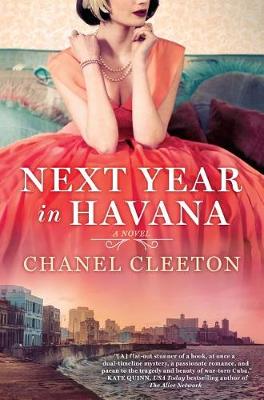Reviewed by girlinthepages on
Next Year in Havana focuses on a dual timeline between Elisa, a Cuban sugar heiress living in Havana in during the mid-1900s revolution, and Marisol, her granddaughter who is trying to reconcile her Cuban identity with her American one, despite being second generation and born in Miami. As the daughter and granddaughter of immigrants myself, there was so much about Marisol's story that I deeply resonated with: her untethered sense of self that feels a loyalty to two cultures, a deep connection to a country she's never been to but that defines her identity so much, the struggle of feeling like she can't claim her heritage because she looks different than her Cuban relatives or has an accent on her Spanish, the difficulty reconciling a country with dangerous and corrupt policies with the gilded memories shared by her relatives, frozen in time. At times I had to put the book down and just absorb the narrative, as it made me feel seen in a way I haven't before felt when reading.
Based on the cover and synopsis, it may be easy to lump this novel into the "historical romance" or "chick lit" genres, but it's honestly SO much more than that. The bulk of the novel is actually very politically centered, and I learned so much about Cuba's government and history-both past and present- and the country itself was more of a presence than any of the romances were. It was so refreshing to dive back into a history lesson and almost gave me the sense of reading non-fiction at times (in a good way)- I felt intellectually stimulated in a way I haven't since reading a novel in college.
I also really enjoyed the dual timeline perspective. Both Marisol and Elisa's narratives felt quite distinct, and while I preferred Elisa's a bit more (she felt like more of a fleshed out character to me) I appreciated the parallelism between their own stories in Havana- it felt fated but not contrived. I also love how both were able to both critique and love the city and country at the same time, and find the beauty in the hardships and the horror in the paradise- it was truly realistic the internal civil war both felt about their Cuban heritage and the state of the country itself. I especially enjoyed reading both women's relationships with the secondary characters, from Elisa's sisters (more books about all of them, please!) and Marisol's interactions with her grandmother's best friend's family, which showcased the juxtaposition of Cubans who stayed vs. Cubans who left during the revolution.
Overall: Next Year in Havana draws you in with it's beautiful cover and romantic premise, but keeps you reading with its deep political roots and raw emotion. I screamed in delight when I found at the end of my copy an announcement that a companion novel is releasing in 2019, and you can bet this is now one of my favorite adult series, and has reignited my love for historical fiction.This review was originally posted on Girl in the Pages
Reading updates
- Started reading
- 15 September, 2018: Finished reading
- 15 September, 2018: Reviewed
